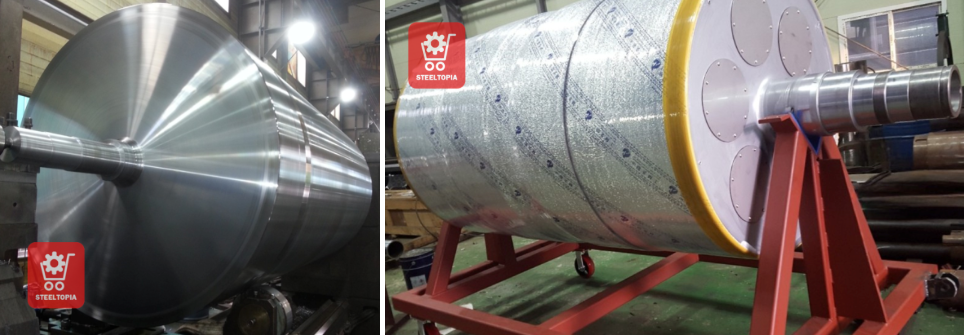-
About
-
Our Brand
-
Products
-
Community
Community
Blog
Blog
Production Process & Quality Control of Industrial Specialty Rollers f…
- Writer
- STEELTOPIA
- Date
- 24-12-19
Production Process & Quality Control of Industrial Specialty Rollers for Film Rollers: From Design to Delivery

Industrial rollers play a crucial role in various industries. Especially in processes such as rolling, film and packaging production, semiconductors, secondary batteries, textiles, and steel processing, the precision and durability of rollers significantly impact production quality. This article delves into how industrial rollers are manufactured and how their quality is meticulously managed.

Production Process of Industrial Specialty Rollers
1. Order Placement
- Receiving Customer Requirements: Collaborate with clients to gather detailed specifications, including roller size, operating environment, and functional characteristics.
- Technical Review & Design Preparation: Evaluate the feasibility of meeting the requirements and conduct additional consultations if needed.
- Finalizing Production Schedule: Develop a production plan based on the order details.
2. Design Phase
- Analyzing Customer Needs: Design rollers considering operating environments, working conditions, size, and load requirements.
- Creating Drawings: Prepare precise designs to meet the client’s specifications.
- Material Selection: Choose suitable materials, such as stainless steel (SUS304, SUS316), carbon steel, or alloy steel, depending on the application.
3. Processing Phase
- Cutting & Shaping: Use CNC lathes and milling machines to shape pipes and other materials into the roller’s basic form.
- Grinding: Perform an initial grinding process to remove rough surfaces and achieve uniformity.
Ensure the roller’s surface is meticulously polished for applications requiring high precision.
- Heat Treatment: Enhance durability and strength through heat treatment if necessary.
4. Coating & Finishing
- Plating Process: Apply coatings to improve the roller’s wear resistance and corrosion resistance.
Steps include dipping into plating tanks, primary coating, interim inspections, re-dipping, and final dimension checks.
- Surface Finishing: Conduct precision finishing processes, including secondary grinding and final inspections, to produce high-quality rollers.
5. Packaging & Delivery
- Packaging: Apply customized protective packaging to prevent surface damage to the rollers.
Use sturdy packing materials and wooden boxes for long-distance transportation.
- Delivery: Employ appropriate transportation methods to safely deliver the rollers to the specified location.
Quality Control During Production
- Precision Testing: Measure roundness, surface roughness, and other critical parameters.
- Durability Testing: Conduct load and wear resistance tests.
- Customized Testing: Perform additional tests tailored to specific industrial requirements, such as high-temperature or corrosive environments.
Importance of Production & Quality Control
Accurate production processes determine the quality and lifespan of industrial rollers. We deliver high-quality industrial rollers optimized to meet our clients' specific requirements through carefully managed production procedures.
"The Journey to Crafting Perfect Rollers"
Industrial rollers are not merely mechanical parts but the culmination of advanced manufacturing processes and quality management. The accumulated expertise and meticulous efforts of manufacturers ensure the performance and quality of the final product. Explore the best roller solutions for your business with our team of experts today!


 HOME
HOME